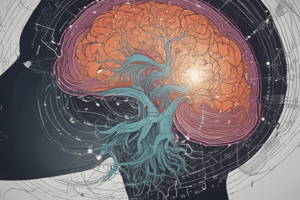Podcast
Questions and Answers
What distinguishes problem solving from decision-making?
What distinguishes problem solving from decision-making?
- Problem solving requires generating one's own solutions. (correct)
- Problem solving is a purely automatic process.
- Decision-making involves solving complex equations.
- Problem solving involves selecting from presented options.
What is the primary characteristic of well-defined problems?
What is the primary characteristic of well-defined problems?
- They have a standard initial state and clear rules. (correct)
- They involve unknown goal states.
- They have multiple possible solutions.
- They require extensive personal intuition to solve.
Which type of reasoning relies on available information but does not guarantee valid conclusions?
Which type of reasoning relies on available information but does not guarantee valid conclusions?
- Inductive reasoning (correct)
- Informal reasoning
- Formal reasoning
- Deductive reasoning
What aspect of problem solving indicates that it is not entirely reliant on automatic processes?
What aspect of problem solving indicates that it is not entirely reliant on automatic processes?
Which of the following best defines the term 'judgement' in the context of decision-making?
Which of the following best defines the term 'judgement' in the context of decision-making?
What is a Type A matchstick problem?
What is a Type A matchstick problem?
What impact does lateral PFC damage have on solving matchstick arithmetic problems?
What impact does lateral PFC damage have on solving matchstick arithmetic problems?
What is the role of hints in problem-solving according to representational change theory?
What is the role of hints in problem-solving according to representational change theory?
What is meant by the term 'incubation' in problem solving?
What is meant by the term 'incubation' in problem solving?
Which of the following describes a challenge posed by Type B matchstick problems?
Which of the following describes a challenge posed by Type B matchstick problems?
What effect does swinging arms have on problem-solving ability in participants?
What effect does swinging arms have on problem-solving ability in participants?
Incubation effects are more pronounced in which type of problems?
Incubation effects are more pronounced in which type of problems?
What is a mental set?
What is a mental set?
How does functional fixedness impact problem-solving?
How does functional fixedness impact problem-solving?
What role does cognitive control play in insight and problem-solving?
What role does cognitive control play in insight and problem-solving?
Which brain regions are associated with the Aha! experience during insightful problem solving?
Which brain regions are associated with the Aha! experience during insightful problem solving?
What does representational change theory propose is necessary to overcome an impasse in problem solving?
What does representational change theory propose is necessary to overcome an impasse in problem solving?
Which of the following methods is NOT part of the representational change approach to achieve insight?
Which of the following methods is NOT part of the representational change approach to achieve insight?
What conclusion can be drawn from the study on eye movements during insight problem solving?
What conclusion can be drawn from the study on eye movements during insight problem solving?
What is an impasse in the context of problem solving?
What is an impasse in the context of problem solving?
Flashcards
Representational Change Theory: Initial Stage
Representational Change Theory: Initial Stage
The initial stage of problem-solving involves forming a mental representation of the problem using prior knowledge and perceptual processes.
Impasse in Problem Solving
Impasse in Problem Solving
The experience of getting stuck and not knowing how to proceed while solving a problem.
Constraint Relaxation
Constraint Relaxation
This involves removing limitations on what is considered acceptable in the problem-solving process.
Re-encoding in Problem Solving
Re-encoding in Problem Solving
Signup and view all the flashcards
Elaboration in Problem Solving
Elaboration in Problem Solving
Signup and view all the flashcards
Mental Set
Mental Set
Signup and view all the flashcards
Functional Fixedness
Functional Fixedness
Signup and view all the flashcards
Generic-parts Technique
Generic-parts Technique
Signup and view all the flashcards
Cognitive Control
Cognitive Control
Signup and view all the flashcards
Incubation Effect
Incubation Effect
Signup and view all the flashcards
Type A Matchstick Puzzles
Type A Matchstick Puzzles
Signup and view all the flashcards
Type B Matchstick Puzzles
Type B Matchstick Puzzles
Signup and view all the flashcards
Representation Constraint
Representation Constraint
Signup and view all the flashcards
Incubation
Incubation
Signup and view all the flashcards
String Problem
String Problem
Signup and view all the flashcards
Problem Solving
Problem Solving
Signup and view all the flashcards
Decision Making
Decision Making
Signup and view all the flashcards
Judgement
Judgement
Signup and view all the flashcards
Deductive Reasoning
Deductive Reasoning
Signup and view all the flashcards
Informal Reasoning
Informal Reasoning
Signup and view all the flashcards
Study Notes
Learning Goals
- Different strategies for problem solving
- How creativity and analogies aid problem solving
- Classification of problems
Forms of Thinking
- Problem solving is a cognitive process moving from problem recognition to solution via steps.
- Problem solving differs from decision-making, requiring unique solutions rather than selecting existing options.
- Deductive reasoning logically entails conclusions based on provided facts.
- Informal reasoning evaluates argument strength using experience and knowledge.
- Inductive reasoning determines truth or hypothesis based on available info (not guaranteed).
Introduction
- Problem solving involves recognizing a gap between two states,
- A problem exists when existing knowledge doesn't lead to immediate solutions.
- Well-defined problems involve known initial states, goal states and valid moves.
- Ill-defined problems have unclear initial states, goal states, or valid moves.
- Knowledge-rich problems require specific expertise, while knowledge-lean problems can be solved using readily available information.
Gestalt Approach and Role of Experience
- Reproductive thinking uses established experiences for well-defined problems
- Productive thinking involves novel problem restructuring for ill-defined problems.
- Insight involves a sudden comprehension of solution, restructuring mental representations.
- Aha! experience is associated with non-conscious knowledge accumulation.
- Insights can sometimes be mistaken solutions, especially when quick.
- Insight problems involve specific brain areas, such as the anterior temporal gyrus and anterior cingulate cortex.
- Emotion plays a role in insightful problem-solving, indicated by autonomic arousal.
- Representational change theory describes initial problem representation, unconscious search for relevant strategies, and an impasse/blocked state overcome through different strategies.
Facilitating Insight
- Incubation, a temporary break from problem solving, sometimes aids resolution.
- Mental set refers to the tendency to use familiar strategies, even when less effective for the current problem.
- Functional fixedness limits the perceived functions of objects.
- Specific techniques exist to overcome functional fixedness and enhance creativity in problem-solving.
Cognitive Control
- Cognitive control, the ability to focus on relevant information, influences how efficiently individuals solve problems.
- Narrowed focus can hinder problem-solving, particularly in tasks requiring broader awareness.
- Cognitive control can interfere with insightful solutions in specific instances.
- Working memory capacity affects problem-solving abilities.
Problem Solving Strategies
- Problem space is a method for mapping possible problem states.
- Heuristics are simple, cognitive rules used to make approximations, unlike algorithms which use specific procedures.
- Hill climbing is a heuristic focusing on short-term steps towards a goal.
- Means-end analysis, a heuristic, identifies sub-goals to bridge differences.
- Meta-reasoning involves evaluating progress, modifying strategies, or switching to other approaches when necessary.
Planning
- Individuals planning complex problems typically use prefrontal areas initially.
- Distinguishing between plan production (creating a plan) and plan execution (implementing a plan).
- Problem solvers often use short-term solutions due to memory constraints.
- Adjustments during task execution are possible, which demonstrates flexibility in planning.
Analogical Problem Solving
- Analogical problem solving involves identifying similarities between current and past problems for efficient problem-solving.
- Superficial, structural, and procedural similarities can aid problem-solving.
- Individual skills in applying analogies, particularly those with higher fluid intelligence, lead to greater success.
- Analogical problem-solving enhances creativity by utilizing past experiences.
Expertise
- Expertise represents high levels of knowledge and performance in a specific area.
- Chess players exhibit specialized cognitive skills like pattern recognition.
- Expert chess players demonstrate superior memory encoding and retrieval of knowledge.
- Template theory describes abstract schematic representation templates used by experts, which are built on general chunks of knowledge.
Studying That Suits You
Use AI to generate personalized quizzes and flashcards to suit your learning preferences.




